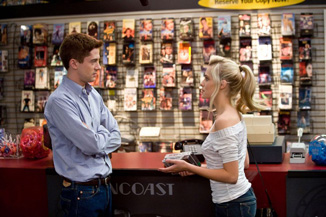|
|
BOP Interview: Topher Grace and Teresa PalmerBy Ryan MazieMarch 3, 2011
Teresa, for such a short filmography you have done so many genres. Do you consciously seek out parts according to their genres? TP: I do actually. I definitely like to push the boundaries and constantly surprise myself and challenge myself in ways that I haven’t been challenged before. So in I Am Number Four I had to transform every part of who I was to embody this ferocious warrior and then in Take Me Home Tonight I was this bubbly, fun chick. I like to switch it up, because that means I don’t get too bored with my character. Can you relate to the characters both of you play in the film? TP: I think Topher relates to Matt Franklin in many ways (laughs). TG: I worked at Suncoast Video for two years when it was still a video store, but there is not a lot of autobiography. It was more that we wanted to have a scene in the mall. But these stores like Sam Goody don’t exist anymore, so it will be better to watch this film a couple years from now. When ‘80s movies start, they have to be in a mall and Suncoast Video was just hilarious. My silly story about Suncoast was that I worked there because I thought I’d just watch movies all summer (laughs). And then they played the same movie over and over again, which was Space Jam. That’s the worst movie ever made now. So awful and I’ve probably seen it about 3,000 times. Topher, you were an executive producer too. How did that affect your acting? TG: It certainly was really difficult. A real learning curve for me, but I’d say the thing I did was I got to spend a lot of time with the director which you just don’t get as an actor. Working on the script we’d ask, “What happened two minutes before this scene starts?” so I felt like I had a real knowledge of everything about the film and why it was there. That would be the reason why I’d want to do it again if I did. Why do you think a movie set in the ‘80s will be relevant to audiences today? TG: The best thing about American Graffiti and Dazed and Confused is that they aren’t spoof movies. It’s weird, because when you spoof a decade, it’s really a broad thing to do. No one in the ‘70s was like, “What’s up with these bellbottoms?” Right now, no one is questioning what we are wearing now, asking, “Why are you wearing a baseball cap?” It’s not something people do. So when you go broad, it makes it weirdly specific. If you keep it more specific in the terms of telling the story though, there is actually a bigger thing audiences can walk away with. And I think it’s how Matt’s life is resolved in terms of what he might want to do at the end of the film. It’s what the ball came out of. It’s tough when structure ends. It’s middle school, high school, and college, then no more structure. It’s a 360 that you can do anything on your own. It’s almost paralyzing that you have so many options and Matt’s so smart, he’s talked himself out of doing anything really. He’s a bright guy. We wanted to make sure that you knew he was a bright guy and that’s his issue. We set it in the ‘80s, but it is a much more timeless, and it might be even more relevant today with more kids living with their folks after college.
|

|
|
|

|
Tuesday, May 7, 2024
© 2024 Box Office Prophets, a division of One Of Us, Inc.


